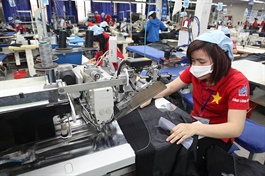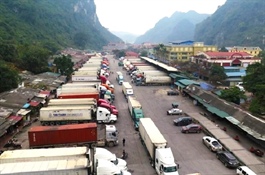New decision a legal tool to accelerate equitisation process
New decision a legal tool to accelerate equitisation process
The Prime Minister’s newly-issued decision on State capital divestment at enterprises is an important legal tool to accelerate the current sluggish equitisation process of State-owned enterprises (SOEs), said Deputy Minister of Planning and Investment Tran Duy Dong.

Decision No 22/2021/QD-TTg dated July 2, 2021 of the Prime Minister stipulates criteria for the classification of State-owned enterprises and State-invested enterprises undergoing ownership conversion, restructuring and divestment in 2021-2025.
“It helps improves the efficiency of management over the use of State capital in enterprises, at the same time enhances the publicity and transparency in State management in SOEs,” Dong told Viet Nam News Agency in a recent interview.
Dong said that Decision No 22 clearly showed the decentralisation of powers of the Government and the Prime Minister in re-organising State enterprises.
For example, as for parent companies of State-owned corporations, parent companies in groups of parent company-subsidiary companies that are single-member limited liability companies with 100 per cent of charter capital held by the State (hereinafter referred to as "parent companies"), the Prime Minister will directly approve their restructuring plans.
As for subsidiaries in groups of parent company-subsidiary companies that are single-member limited liability companies with all charter capital held by the State, their parent companies have the right to approve their restructuring plans.
Under the decision, the Prime Minister will approve restructuring plans for nearly 500 "parent companies”, such as maintaining an enterprise in which the State holds 100 per cent of charter capital, the State will hold from over 50 per cent to under 65 per cent of charter capital after the equitisation, or the State will hold from 65 per cent of charter capital after equitisation.
Notable names in the restructuring list include the Vietnam Posts and Telecommunications Group (VNPT), Electricity of Vietnam (EVN), The Viet Nam Oil and Gas Group (PVN), Viet Nam National Coal and Minerals Group (Vinacomin or TKV), Viet Nam National Chemical Group (Vinachem), Military Industry-Telecoms Group (Viettel) and the State Capital Investment Corporation (SCIC).
State-owned enterprises after equitisation operated more efficiently as the management and the use of State capital was improved. This was reflected in the growth rates, the results of production and business activities, the average income of employees, the total payment to the State budget, as well as the ability to compete with private enterprises, according to Dang Quyet Tien, Director of the Corporate Finance Department under the Ministry of Finance.
“It is not difficult to recognise the common characteristics of leading enterprises in Viet Nam today, which is they all originated as State-owned enterprises. They are Vinamilk (Viet Nam Dairy Products JSC), FPT (Information-telecommunication-technology group FPT Corporation) or REE (The Refrigeration Electrical Engineering Corporation),” he said.
“They are all improving operational efficiency and always maintain a high capitalisation value,” he said.
“Since switching to a joint-stock company model with the dominant participation of State shareholders, particularly the State Capital Investment Corporation (SCIC) since 2005, SCIC has always shown the role of a large, dynamic and active shareholder of FPT, supporting the company to fulfil its business and production tasks effectively,” said Chairman of FPT Telecom Hoang Nam Tien.
“State-owned enterprises are playing a leading role, paving the way for other economic sectors, especially when the economy recovers after the COVID-19 pandemic,” he said.
The Ministry of Finance said in the first months of this year, the ministry had received equitisation plans of enterprises including the Northern Food Corporation and the Viet Nam National Coal and Minerals Group with a total value of VND252 billion (US$11 million).
Accumulated from 2016 to June 2021, 183 enterprises have been approved for equitisation.
The number of enterprises that must be equitised as planned for the remaining months of 2021 is 89, a goal which is unlikely to be achieved, said the finance ministry.
“Financial problems in the process of business management and administration have not been thoroughly resolved, causing difficulties and delays for the process of equitisation and divestment,” said Dang Quyet Tien, Director of the Corporate Finance Department under the Ministry of Finance.
“Enterprises have not yet improved their operational efficiency. Therefore, the results of production and business activities remain relatively inefficient, making it difficult to attract investors when implementing equitisation,” Tien said.
























